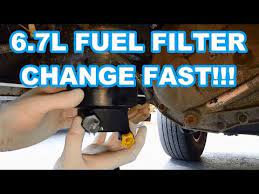When to Change Fuel Filter
The diesel fuel filter ensures that the clean fuel delivered to your engine is free from impurities such as rust particles, metal shavings, organic deposits and even sand and clay particles.
Filters must be regularly changed on vehicles driven in harsh conditions; to know when it’s time for replacement fuel filter diesel: 1. Hard Starting.
1. Clogged Filter
Fuel filters become clogged over time with debris, collecting dirt, soot, and other contaminants until it can no longer do its job of keeping engines healthy by providing clean fuel to them. When this occurs, their engines begin experiencing issues.
Clogs in your fuel filter can lead to problems like difficulty starting the engine, misfires and poor power performance – as well as possibly activating your check engine light.
To change your fuel filter, start by loosening its cap. Take extra care not to spill any fuel and consider placing oil-absorbent sheets beneath it as well. Next, remove and replace the old dirty filter with the new one – once finished be sure to wipe down both seal and seating surfaces on both cap and housing for cleanliness before tightening with torque wrench to manufacturer specs – don’t forget the O-ring provided as part of its purchase; this will prevent future leaking caps or issues!
2. Water Separator Leaks
As soon as a diesel fuel filter becomes too clogged, its effects ripple throughout the entire engine. Without enough fuel reaching injectors to supply proper amounts, power may decrease and there may be an increased chance of stalling.
To prevent this from occurring, it is recommended to change your diesel fuel filter according to its manufacturer’s recommendation schedule. This schedule usually provides both normal conditions and harsh conditions intervals depending on how often and for how long you use your vehicle.
Change out a filter on most diesel vehicles is an easy job. Simply consult your owner’s manual to locate it, jack the vehicle up for easier access, remove and replace with new filters (placing a container underneath each old filter in case any fuel spills), secure their caps tightly using a torque wrench to ensure their tightening meets manufacturer specifications and tighten tight enough.
3. Hard Starting
Diesel vehicles have grown increasingly popular as people discover their fuel efficiency and power. Like any vehicle, however, you must perform routine maintenance on your diesel engine to keep it in top shape; this includes regularly replacing its fuel filter as recommended by its manufacturer and using an appropriate diesel filtration system to protect its components from soot and debris accumulation.
If your diesel has difficulty starting or seems likely to stall, it may be time for a fuel filter change. A clogged filter won’t allow enough fuel into your engine and could damage injectors and other components over time.
Check your owner’s manual for recommended replacement schedule. If you are unfamiliar with how to complete this task yourself, visit a Reno mechanic that specializes in diesel engine repair for assistance. Otherwise, simply locate and drain out the filter (it should be located near your fuel line) into a pan before taking steps to replace and remove it.
4. Poor Engine Performance
Poorly maintained filters clog, stopping fuel flow to your engine. This causes your pump to work harder and potentially destroy itself over time, as well as inhibiting its heater from performing properly, leaving your vehicle with subpar acceleration and performance.
Check your owner’s manual for a recommended oil change interval, which could range anywhere from every 10,000 miles up to every 25,000. If you frequently transport heavy loads or drive in dusty environments, consider shorter intervals.
To change a diesel fuel filter, drain the old one by loosening its screw and pulling out the new filter. Make sure its arrow points in the same direction as that on the old filter before screwing it in with hand tightening – or tighten using wrench according to manufacturer specifications if applicable. Wayne’s Automotive provides financing solutions through Synchrony Bank that may help offset some of its cost.




Post Comment